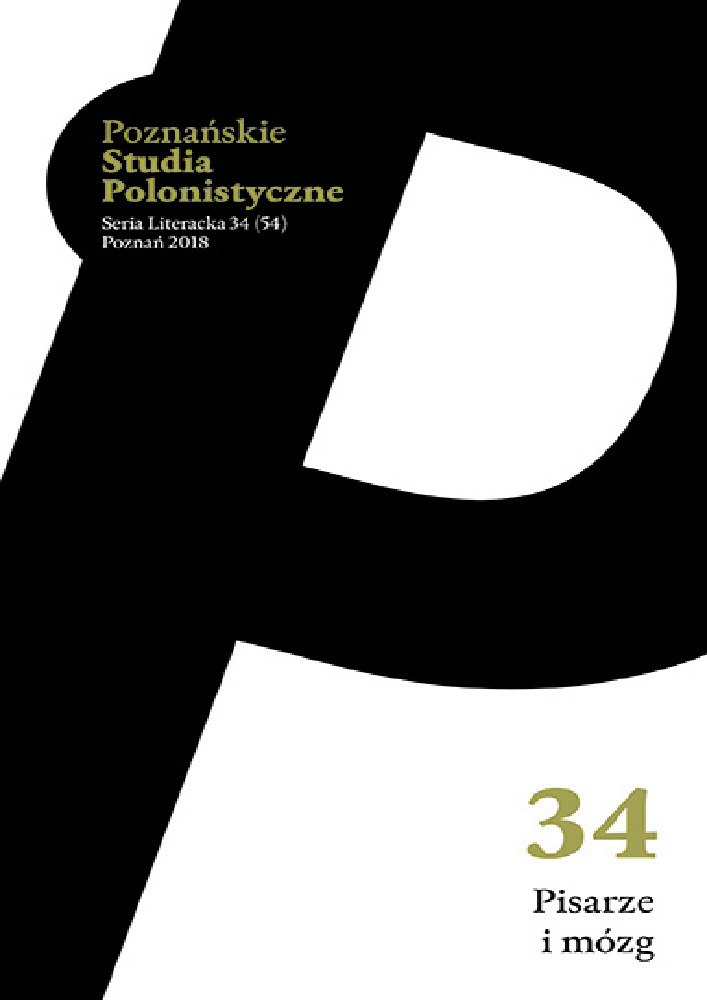Abstract
In the text, I address the subject of neurocognitive science, art and literature in various perspectives, whose connecting point is the perspective of the experiencing subject and her embodiment. The embodied and involved subject reveals through her ailments and suffering dimensions of experience not always visible in the state of health and well-being. The starting point of my deliberations are issues in the field of neurocognitive science and neuroesthetics as the areas that attempt to explain the neurobiological mechanisms of perception of art and literature. Next, I refer to research in the field of neuroanthropology, through which the positive and creative dimensions of the illness experience are noticed. I also refer to psychopathology as an area that shows the dimensions of human experience in a much more fundamental way than it is able to show the experience of everyday life.References
Armstrong Paul B. (2013), How Literature Plays with the Brain. The Neuroscience of Reading and Art, Johns Hopkins University Press, Baltimore [USA].
Choudhury Suparna, Slaby Jan (2012), Critical Neuroscience: A Handbook of the Social and Cultural Contexts of Neuroscience, Wiley-Blackwell, Malden [USA].
Dehaene Stanislas (2009), Reading in the Brain: The Science and Evolution of a Human Invention, Viking, New York [USA].
Domínguez Juan F. (2012), Neuroanthropology and the dialectical imperative, „Anthropological Theory”, vol. 12, s. 5-27.
Fuchs Thomas (2002a), Mind, Meaning and the Brain, „Philosophy, Psychiatry & Psychology”, vol. 9, nr 3, s. 261-264.
Fuchs Thomas (2002b), The Challenge of Neuroscience. Psychiatry and Phenomenology Today, „Psychopathology”, nr 35 (66), s. 319-326.
Fuchs Thomas (2005), Corporealized and Disembodied Minds. A Phenomenological View of the Body in Melancholia and Schizophrenia, „Philosophy, Psychiatry & Psychology”, vol. 12, nr 2, s. 95-107.
Gibbs Raymond W. (2006), Embodiment and Cognitive Science, Cambridge University Press, Cambridge [Wielka Brytania].
Holland Norman (2009), Literature and the Brain, PsyArt Foundation, Gainesville [USA].
Kędra-Kardela Anna (2010), Reading as Interpretation. Towards a Narrative Theory of Fictional World Construction, Wydawnictwo UMCS, Lublin.
Kiverstein Julian (2012), The Meaning of Embodiment, „Topics in Cognitive Science”, vol. 4, s. 740-758.
Myers Anne Laurenzo Neely (2012), Toward an Applied Neuroanthropology of Psychosis. The Interplay of Culture, Brains and Experience, „Annals of
Anthropological Practice”, vol. 36, nr 1, s. 113-130.
Panksepp Jaak (2004), Affective Beuroscience. The Foundations of Human and Animal Emotions, Oxford University Press, New York [USA].
Przybysz Piotr (2014), O poznawaniu innych umysłów. Wokół kognitywistycznych badań nad poznaniem społecznym, Bogucki Wydawnictwo Naukowe, Poznań.
Ratcliffe Matthew (2008), Feelings of Being. Phenomenology, Psychiatry and the Sense of Reality, Oxford University Press, Oxford [Wielka Brytania].
Ratcliffe Matthew (2009), Belonging to the World Through the Feeling Body, „Philosophy, Psychiatry & Psychology”, vol. 16, nr 2, s. 205-211.
Rembowska-Płuciennik Magdalena (2012), Poetyka intersubiektywności. Kognitywistyczna teoria narracji a proza XX wieku, Wydawnictwo Naukowe UMK, Toruń.
Ricoeur Paul (2005), O sobie samym jako innym, przeł. Bogdan Chełstowski, oprac. Małgorzata Kowalska, Wydawnictwo Naukowe PWN, Warszawa.
Rizzolatti Giacomo, Sinigaglia Corrado (2008), Mirrors in the Brain: How Our Minds Share Actions and Emotions, trans. Frances Anderson, Oxford University Press, Oxford [Wielka Brytania].
Rowlands Mark (2010), The New Science of the Mind. From extended cognition to embodied phenomenology, MIT Press, Cambridge [USA].
Sacks, Oliver (1994), Mężczyzna, który pomylił swoją żonę z kapeluszem, przeł. Barbara Linderberg, Wydawnictwo Zysk i S-ka, Poznań.
Sacks Oliver (1995), Antropolog na Marsie, przeł. Piotr Amsterdamski, Wydawnictwo Zysk i S-ka, Poznań.
Sass Louis Arnorsson (1994), Madness and Modernism: Insanity in the Light of Modern Art, Literature, and Thought, Harvard University Press, Harvard [USA].
Zeki Semir (2004), The Neurology of Ambiguity, „Consciousness and Cognition”, nr 13, s. 173-196.
License
Authors
Authors of texts accepted for publication in „Poznańskie Studia Polonistyczne. Seria Literacka” are required to complete, sign and return to the editor's office the Agreement for granting a royalty-free license to works with a commitment to grant a CC sub-license.
Under the agreement, the authors of texts published in „Poznańskie Studia Polonistyczne. Seria Literacka” grant the Adam Mickiewicz University in Poznań a non-exclusive, royalty-free license and authorize the use of Attribution-NoDerivatives 4.0 International (CC BY-ND 4.0)Creative Commons sub-license.
The authors retain the right to continue the free disposal of the work.
Users
Interested Internet users are entitled to use works published in „Poznańskie Studia Polonistyczne. Seria Literacka” since 2016, for non-commercial purposes only, under the following conditions:
- attribution - obligation to provide, together with the distributed work, information about the authorship, title, source (link to the original work, DOI) and the license itself.
- no derivatives - the work must be preserved in its original form, without the author's consent it is not possible to distribute the modified work, such as translations, publications, etc.
Copyrights are reserved for all texts published before 2016.
Miscellaneous
Adam Mickiewicz University in Poznań retains the right to magazines as a whole (layout, graphic form, title, cover design, logo etc.).
